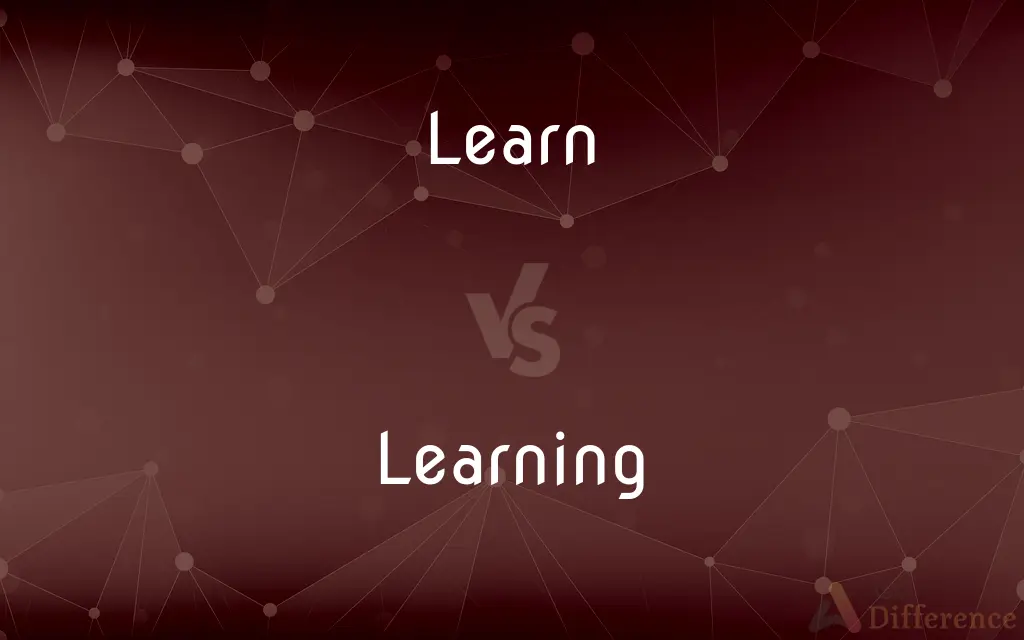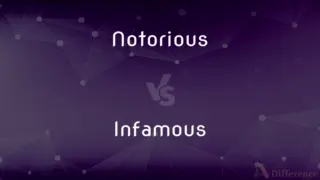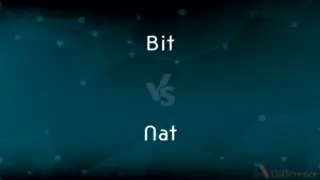Learn vs. Learning — What's the Difference?
Edited by Tayyaba Rehman — By Fiza Rafique — Updated on October 24, 2023
"Learn" is a verb denoting the act of acquiring knowledge or skill, while "learning" can be a verb form (present participle) or a noun signifying the process or thing learned.

Difference Between Learn and Learning
Table of Contents
ADVERTISEMENT
Key Differences
"Learn" is fundamentally a verb that indicates the action of acquiring knowledge or skills. Conversely, "learning" operates both as the continuous form of the verb "learn" and as a noun representing the acquisition process itself.
When someone says they "learn," it often suggests a completed action or intent, like having gained a new skill or knowledge. "Learning," when employed as a verb, portrays an ongoing action, while as a noun, it underscores the continuous process or the acquired knowledge.
Consider the difference in these contexts: "I want to learn Spanish" denotes a future intent. In contrast, "I am learning Spanish" reflects an ongoing endeavor, and "My learning experience was positive" treats "learning" as a tangible entity or experience.
One can interpret "learn" as a foundational action. It's direct and points to the very act of acquiring. "Learning," however, extends this notion either into an ongoing scenario or encapsulates the broader experience or knowledge one gains.
Conclusively, while "learn" zeroes in on the action of acquisition, "learning" offers a broader scope, emphasizing either the process's continuity or the outcome of such an action.
ADVERTISEMENT
Comparison Chart
Grammatical Category
Verb
Present participle (verb) and Noun
Tense Usage
Present, Past, Future
Present Continuous (as verb)
Example Usage
I learn, I learned, I will learn
I am learning (verb), My learning is progressing (noun)
Nature
Direct action
Ongoing process (verb) or the outcome/process (noun)
Associated Phrases
Learn a lesson, learn by heart
Learning curve, learning process
Compare with Definitions
Learn
To find out, often by experience or trial and error.
You'll learn patience as you grow older.
Learning
Cognitive processes involved in acquiring skill or knowledge.
Effective teaching facilitates student learning.
Learn
To become informed or aware of something.
She was surprised to learn of his departure.
Learning
Knowledge or skill acquired through experience or study.
Her learning in mathematics is exceptional.
Learn
To commit to memory.
We had to learn the poem by heart.
Learning
The act or process of acquiring knowledge or skill.
Learning a new language can be challenging.
Learn
To become accustomed to.
It took time to learn the new software.
Learning
The state of being educated or enlightened.
Lifelong learning is a journey of personal growth.
Learn
To gain knowledge of or skill in through study, instruction, or experience
Learned how to sail.
Learned the new computer program.
Learn to speak Hindi.
Learning
(Psychology) Changes in behavior resulting from experience, especially changes due to conditioning.
Learn
To become aware or informed of; find out
Learned the truth about him.
Learned that it was best not to argue.
Learning
The modification of behavior through experience and training.
The dog's learning was evident after obedience classes.
Learn
To fix in the mind or memory; memorize
Learned the speech in a few hours.
Learning
Learning is the process of acquiring new understanding, knowledge, behaviors, skills, values, attitudes, and preferences. The ability to learn is possessed by humans, animals, and some machines; there is also evidence for some kind of learning in certain plants.
Learn
(Nonstandard) To cause to acquire knowledge; teach.
Learning
The acquisition of knowledge or skills through study, experience, or being taught
An important learning process
These children experienced difficulties in learning
Learn
(Obsolete) To give information to.
Learning
The act, process, or experience of gaining knowledge or skill.
Learn
To gain knowledge, information, comprehension, or skill
Learns quickly.
Learned about computers.
Learned of the job through friends.
Learning
Knowledge or skill gained through schooling or study.
Learn
To acquire, or attempt to acquire knowledge or an ability to do something.
Learning
(uncountable) An act in which something is learned.
Learn
To attend a course or other educational activity.
Learning
(uncountable) Accumulated knowledge.
The department head was also a scholar of great learning.
Learn
To gain knowledge from a bad experience so as to improve.
Learn from one's mistakes
Learning
(countable) Something that has been learned
Learn
To study.
I learn medicine.
They learn psychology.
Learning
Present participle of learn
I'm learning to ride a unicycle.
Learn
To come to know; to become informed of; to find out.
He just learned that he will be sacked.
Learning
The acquisition of knowledge or skill; as, the learning of languages; the learning of telegraphy.
Learn
To teach.
Give him a clip round the ear. That'll learn him!
Learning
The knowledge or skill received by instruction or study; acquired knowledge or ideas in any branch of science or literature; erudition; literature; science; as, he is a man of great learning.
Learn
The act of learning something
Learning
The cognitive process of acquiring skill or knowledge;
The child's acquisition of language
Learn
To gain knowledge or information of; to ascertain by inquiry, study, or investigation; to receive instruction concerning; to fix in the mind; to acquire understanding of, or skill; as, to learn the way; to learn a lesson; to learn dancing; to learn to skate; to learn the violin; to learn the truth about something.
Now learn a parable of the fig tree.
Learning
Profound scholarly knowledge
Learn
To communicate knowledge to; to teach.
Hast thou not learned me howTo make perfumes ?
Learn
To acquire knowledge or skill; to make progress in acquiring knowledge or skill; to receive information or instruction; as, this child learns quickly.
Take my yoke upon you and learn of me.
Learn
Acquire or gain knowledge or skills;
She learned dancing from her sister
I learned Sanskrit
Children acquire language at an amazing rate
Learn
Get to know or become aware of, usually accidentally;
I learned that she has two grown-up children
I see that you have been promoted
Learn
Commit to memory; learn by heart;
Have you memorized your lines for the play yet?
Learn
Be a student of a certain subject;
She is reading for the bar exam
Learn
Impart skills or knowledge to;
I taught them French
He instructed me in building a boat
Learn
Find out, learn, or determine with certainty, usually by making an inquiry or other effort;
I want to see whether she speaks French
See whether it works
Find out if he speaks Russian
Check whether the train leaves on time
Learn
To acquire knowledge or skill.
I want to learn how to play the guitar.
Common Curiosities
How is "learning curve" related to the word "learning"?
It refers to the time and effort required to learn something new.
Is "learn" always an active process?
No, one can passively learn by observation or immersion.
Is "learning" always a formal process?
No, learning can be formal (in schools) or informal (life experiences).
Can "learn" be used interchangeably with "study"?
Not always. "Study" is deliberate, while "learn" can be incidental.
Can "learning" represent both the journey and the outcome?
Yes, it can mean the process of acquiring or what is acquired.
Can animals "learn"?
Yes, animals can learn behaviors through training or experience.
Is "learned" the past form of "learn"?
Yes, "learned" is the past tense and past participle of "learn."
Is it correct to say "I'm learning to learn"?
Yes, it indicates mastering the skill of acquiring knowledge.
Is there a difference between "learning" and "education"?
Yes, while both involve acquiring knowledge, education often implies a structured system or institution.
Can "learning" be a lifelong endeavor?
Absolutely, many believe in the concept of lifelong learning.
Is "to learn" a regular or irregular verb?
It's regular, with forms like learn, learned, learned (or learnt in British English).
Can "learning" be both a collective and individual experience?
Yes, learning can happen individually or in groups, like in classrooms.
How does one "learn by doing"?
It means acquiring knowledge or skills through hands-on experience.
Can "learning" occur unintentionally?
Yes, one can learn unintentionally through experiences or observations.
How is "e-learning" related to "learning"?
"E-learning" refers to electronic learning, often online or through digital platforms.
Share Your Discovery

Previous Comparison
Notorious vs. Infamous
Next Comparison
Bit vs. NatAuthor Spotlight
Written by
Fiza RafiqueFiza Rafique is a skilled content writer at AskDifference.com, where she meticulously refines and enhances written pieces. Drawing from her vast editorial expertise, Fiza ensures clarity, accuracy, and precision in every article. Passionate about language, she continually seeks to elevate the quality of content for readers worldwide.
Edited by
Tayyaba RehmanTayyaba Rehman is a distinguished writer, currently serving as a primary contributor to askdifference.com. As a researcher in semantics and etymology, Tayyaba's passion for the complexity of languages and their distinctions has found a perfect home on the platform. Tayyaba delves into the intricacies of language, distinguishing between commonly confused words and phrases, thereby providing clarity for readers worldwide.
















































